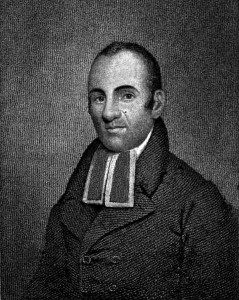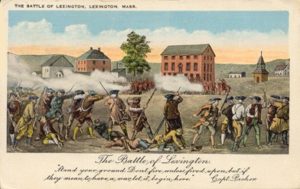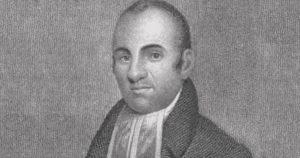 February’s designation as “Black History Month” was inspired by Carter G. Woodson in 1915, with the first official week of celebration being held in 1926 due to both Lincoln and Douglas’ birthdays being the 12th and 14th respectively.
February’s designation as “Black History Month” was inspired by Carter G. Woodson in 1915, with the first official week of celebration being held in 1926 due to both Lincoln and Douglas’ birthdays being the 12th and 14th respectively.
For years I have enjoyed reading about pastors who have left a legacy of their commitment to Christ, loyalty to the Scriptures in applying it to every area of life, as well as their character. One such individual is Lemuel Haynes, the first Black to be ordained (1785) and the first to receive a degree of higher education (1804) in America. Inspired by the first Great Awakening, his ministry experienced the second Great Awakening as well!
Lemuel was born July 18, 1753, in West Hartford, Connecticut, the son of a black man and a white woman. Though biracial, due to the “one-drop rule” (of black blood) in his time, he was considered black. Abandoned by his parents and sold into indentured servitude as an infant, as Jared Wilson has written, “By the providential hand of God, however, young Lemuel was placed into a devoutly Chistian home, whereby all accounts, including his own, he was treated as a member of the family.” Lemuel Haynes wrote: “When I was five months old, I was carried to Granville, Massachusetts, and bound out as a servant to Deacon David Rose till I was twenty-one. He was a man of singular piety. I was taught the principles of religion. His wife, my mistress, had peculiar attachment to me: she treated me as though I was her own child.”
 As a young person, he nearly drowned and later was almost gored by an ox. He came to recognize that the Providence of God was preparing him for a task. Having been taught to read in the common school, Lemuel was often found reading in the “chimney-corner” by the fireplace to learn something each night that he hadn’t known that morning. He recounted his conversion: “I remember I often had serious impressions, or fearful apprehensions of going to hell. I spent much time in what I called secret prayer…. One evening, being under an apple-tree mourning my wretched situation… I found the Savior.” He knew his will alone could not save him. He was soon baptized and joined a church in Worthington, MA.
As a young person, he nearly drowned and later was almost gored by an ox. He came to recognize that the Providence of God was preparing him for a task. Having been taught to read in the common school, Lemuel was often found reading in the “chimney-corner” by the fireplace to learn something each night that he hadn’t known that morning. He recounted his conversion: “I remember I often had serious impressions, or fearful apprehensions of going to hell. I spent much time in what I called secret prayer…. One evening, being under an apple-tree mourning my wretched situation… I found the Savior.” He knew his will alone could not save him. He was soon baptized and joined a church in Worthington, MA.
Lemuel became a disciple of the sermons and stories of revival preachers like Jonathan Edwards and George Whitefield. Wilson wrote, “Given his adeptness at reading and his deep concern for spiritual matters, the Rose family would often ask Haynes to read a portion of Scripture or a published sermon. One night, Haynes read one of his own without credit. At the end, members of the family remarked at its quality and wondered, ‘Was that a Whitefield?’ ‘No,’ Haynes is said to have replied. ‘It was a Haynes.’” Shock probably filled the room, for the family suddenly realized that the “disciple of the chimney-corner” was aflame with a passion and ability to preach!
 Lemuel became naturally inclined to defend the God-given rights of the patriots who were caught in a struggle between tyranny and liberty. Having been touched by slavery and its sinful effects personally, his pursuit of liberty is inspiring. As Timothy Cooley remarks, “Lemuel Haynes was a patriot of the revolution. In his youth he imbibed those great principles respecting the ‘rights of man,’ in defense of which war was raised with the parent country.’” In 1774 he enlisted as a minuteman and joined the army at Roxbury following the battle of Lexington. Here are excerpts from his poem “The Battle of Lexington:”
Lemuel became naturally inclined to defend the God-given rights of the patriots who were caught in a struggle between tyranny and liberty. Having been touched by slavery and its sinful effects personally, his pursuit of liberty is inspiring. As Timothy Cooley remarks, “Lemuel Haynes was a patriot of the revolution. In his youth he imbibed those great principles respecting the ‘rights of man,’ in defense of which war was raised with the parent country.’” In 1774 he enlisted as a minuteman and joined the army at Roxbury following the battle of Lexington. Here are excerpts from his poem “The Battle of Lexington:”
The Nineteenth Day of April last, we ever shall retain;
As monumental of the past, most bloody shocking Scene,
Then Tyrants fill’d with horrid Rage, a fatal journey went,
& unmolested to engage, and slary the innocent…
For Liberty, each Freeman Strives, for it’s a Gift of God,
And for it willingly yield their Lives, and seal it with their Blood…
This Motto may adorn their Tombs, (Let tyrants come and view),
‘We rather seek these silent Rooms, than live as Slaves of you.’
Lemuel married Elizabeth Babbit in 1783. They had 10 children between 1785 and 1805. In 1785 the Second Church of Granville in Connecticut petitioned for his ordination as an evangelist, which was granted on November 9. Lemuel was the first black minister so ordained in America. After serving in Torrington, Connecticut for a couple of years, where he was not called pastor due to their prejudice, he then shepherded an all-white congregation in Rutland, Vermont for 30 years!
After the American Revolution, “a systematic and confident infidelity had been introduced, and it widely prevailed. It boasted of genius, and wealth, and station. Not a few among the leading men in the state were open infidels, and exerted, in many instances, a fatal influence on the rising generation.” So writes Cooley of the environment into which Pastor Lemuel Haynes began the final years of his ministry. In 1803, however, the showers of God’s blessing, during what became known as the Second Great Awakening, were documented by Haynes. Cooley remarks that “the Holy Spirit came down like a mighty rushing wind, bearing away all opposition.”
 Lemuel Haynes writes of this revival in Vermont in 1803: “…it pleased God to arrest the attention of a very thought-less youth, who on Sabbath evening opened his distress to me. We appointed a conference-meeting that week, and, to our astonishment, the house was crowded, and a great number appeared to be under deep impressions. The work spread from week to week, till it was difficult to find any dwelling-house that would hold the people…. Not a day nor night in a week but people would crowd to meetings. The great inquiry among the youth, and others was, ‘What shall we do to be saved?’ Children of eleven and twelve years of age seemed to be more engaged about religion than they were before about their play. The minds of the people in general were attentive. My house has been thronged with people who desired to discourse about religion…. Some of the most open enemies have been bowed to sovereign grace, and brought to sit at the feet of Jesus, and in their right mind.”
Lemuel Haynes writes of this revival in Vermont in 1803: “…it pleased God to arrest the attention of a very thought-less youth, who on Sabbath evening opened his distress to me. We appointed a conference-meeting that week, and, to our astonishment, the house was crowded, and a great number appeared to be under deep impressions. The work spread from week to week, till it was difficult to find any dwelling-house that would hold the people…. Not a day nor night in a week but people would crowd to meetings. The great inquiry among the youth, and others was, ‘What shall we do to be saved?’ Children of eleven and twelve years of age seemed to be more engaged about religion than they were before about their play. The minds of the people in general were attentive. My house has been thronged with people who desired to discourse about religion…. Some of the most open enemies have been bowed to sovereign grace, and brought to sit at the feet of Jesus, and in their right mind.”
These common characteristics of revival were coupled with a theology that directed the river of God to reform character as well as transform both church and culture through application of the Scriptures. For example, Haynes took a stand against the expatriation of slaves to Africa in 1817. This was a notion that the best way to solve the racial tension between white and black was to remove the blacks to Africa.
 Lemuel Haynes died on September 28, 1833 at 80 years of age. As Cooley observed, “It was in the bosom of his family that his character shone the brightest.” We are never greater in public than we are in private. May God give us more pastors whose hearts are surrendered to Christ and whose character shines in their homes so their ministry can extend to both revival of the church and reformation of society!
Lemuel Haynes died on September 28, 1833 at 80 years of age. As Cooley observed, “It was in the bosom of his family that his character shone the brightest.” We are never greater in public than we are in private. May God give us more pastors whose hearts are surrendered to Christ and whose character shines in their homes so their ministry can extend to both revival of the church and reformation of society!







